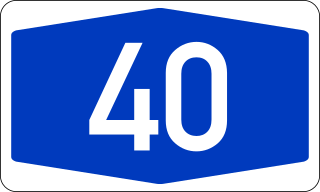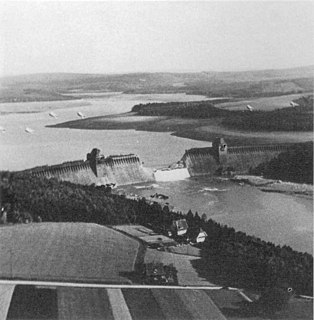
North Rhine-Westphalia is a state of Germany.

The Ruhr is a river in western Germany, a right tributary (east-side) of the Rhine.

The Ruhr is a polycentric urban area in North Rhine-Westphalia, Germany. With a population density of 2,800/km2 and a population of over 5 million (2017), it is the largest urban area in Germany and the third-largest in the European Union. It consists of several large cities bordered by the rivers Ruhr to the south, Rhine to the west, and Lippe to the north. In the southwest it borders the Bergisches Land. It is considered part of the larger Rhine-Ruhr metropolitan region of more than 12 million people, which is among the largest in Europe.

Duisburg is a city of about 500,000 inhabitants in Germany’s Rhineland, at the confluence of the Rhine and the Ruhr. In medieval times, it was a member of the powerful Hanseatic League, and later became a major centre of iron, steel, and chemicals. For this reason, it was heavily bombed in World War II. Today it boasts the world's largest inland port, with 21 docks and 40 kilometres of wharf. The city supports a large Turkish community.

Dortmund is, with a population of 586,600 (2017), the third largest city of Germany's most populous federal state of North Rhine-Westphalia after Cologne and Düsseldorf, and Germany's eighth largest city. It is the largest city of the Ruhr, Germany's largest urban area with some 5.1 million (2011) inhabitants, as well as the largest city of Westphalia. On the Emscher and Ruhr rivers, it lies in the Rhine-Ruhr Metropolitan Region and is considered the administrative, commercial and cultural centre of the eastern Ruhr.

Essen is the central and second largest city of the Ruhr, the largest urban area in Germany. Its population of 583,393 makes it the ninth largest city of Germany, as well as the fourth largest city of the federal state of North Rhine-Westphalia. On the Ruhr and Emscher rivers, Essen geographically is part of the Rhineland and the larger Rhine-Ruhr Metropolitan Region. The Ruhrdeutsch regiolect spoken in the region has strong influences of both Low German (Westphalian) and Low Franconian.

The Ruhr-University Bochum, located on the southern hills of central Ruhr area Bochum, was founded in 1962 as the first new public university in Germany after World War II. Instruction began in 1965.

The Rhine-Ruhr metropolitan region is the largest metropolitan region in Germany with over 10 million inhabitants. It is of polycentric nature. It covers an area of 7,268 square kilometres (2,806 sq mi) and lies entirely within the federal state of North Rhine-Westphalia. The Rhine-Ruhr metropolitan region spreads from Dortmund-Bochum-Essen-Duisburg in the north, to the urban areas of the cities of Mönchengladbach, Düsseldorf, Wuppertal, Leverkusen, Cologne, and Bonn in the south. The location of the Rhine-Ruhr at the heart of the European blue banana makes it well connected to other major European cities and metropolitan areas like the Randstad, the Flemish Diamond and the Frankfurt Rhine Main Region.

Mülheim an der Ruhr, also described as "City on the River", is a city in North Rhine-Westphalia in Germany. It is located in the Ruhr Area between Duisburg, Essen, Oberhausen and Ratingen. It is home to many companies, especially in the food industry, such as the Aldi Süd Company, the Harke Group and the Tengelmann Group.

Hattingen is a town in the northern part of the Ennepe-Ruhr-Kreis district, in North Rhine-Westphalia, Germany.

The Occupation of the Ruhr was a period of military occupation of the German Ruhr valley by France and Belgium between 11 January 1923 and 25 August 1925. The occupation was a response to the German Weimar Republic widely and regularly defaulting on reparation payments in the early 1920s. The total reparation sum of £6.6 billion had been dictated by the victorious powers in the Treaty of Versailles, and the reparation payments were due to last several decades.

Bundesautobahn 40, is one of the most used Autobahns in Germany. It crosses the Dutch-German border as a continuation of the Dutch A67 and crosses the Rhine, leads through the Ruhr valley toward Bochum, becoming B 1 (Bundesstraße 1) at the Kreuz Dortmund West and eventually merging into the A 44 near Holzwickede.

The Verkehrsverbund Rhein-Ruhr, abbreviated VRR, is the public transport association covering the area of the Rhine-Ruhr conurbation in Germany. It was founded on 1 January 1980, and is Europe’s largest body of such kind, covering an area of some 5,000 km² with more than seven million inhabitants, spanning as far as Dorsten in the north, Dortmund in the east, Langenfeld in the south, and Mönchengladbach and the Dutch border in the west.

The Rhine-Ruhr S-Bahn is a polycentric and electrically driven S-train network covering the Rhine-Ruhr Metropolitan Region in the German federal state of North Rhine-Westphalia. This includes most of the Ruhr, the Berg cities of Wuppertal and Solingen and parts of the Rhineland. The easternmost city within the S-Bahn Rhine-Ruhr network is Unna, the westernmost city served is Mönchengladbach.

TU Dortmund University is a university in Dortmund, North Rhine-Westphalia, Germany with over 35,000 students, and over 6,000 staff including 300 professors, offering around 80 Bachelor's and master's degree programs. It is situated in the Ruhr area, the fourth largest urban area in Europe. The university is highly ranked in terms of its research performance in the areas of physics, electrical engineering, chemistry and economics.

Hagen Hauptbahnhof is a railway station serving the city of Hagen in western Germany. It is an important rail hub for the southeastern Ruhr area, offering regional and long distance connections. The station was opened in 1848 as part of the Bergisch-Märkische Railway Company's Elberfeld–Dortmund line and is one of the few stations in the Ruhr valley to retain its original station hall, which dates back to 1910.

The Battle of the Ruhr of 1943 was a 5-month British campaign of strategic bombing during the Second World War against the Nazi Germany Ruhr Area, which had coke plants, steelworks, and 10 synthetic oil plants. The campaign bombed 26 major Combined Bomber Offensive targets. The targets included the Krupp armament works (Essen), the Nordstern synthetic-oil plant (Gelsenkirchen), and the Rheinmetal–Borsig plant in Düsseldorf. The latter was safely evacuated during the Battle of the Ruhr.Although not strictly part of the Ruhr area, the battle of the Ruhr included other cities such as Cologne which were within the Rhine-Ruhr region and considered part of the same "industrial complex". Some targets were not sites of heavy industrial production but part of the production and movement of materiel.

Ruhr.2010 – Kulturhauptstadt Europas was the name of the campaign in Germany's Ruhr region that earned it recognition as a European Capital of Culture in 2010. This was the first time a region was considered, as Essen represented all 53 towns in the region in the application. Other cultural capitals were in the same year the Hungarian Pécs (Pécs2010) and Istanbul in Turkey, where similar campaigns were held.

The Klavier-Festival Ruhr is an annual festival of piano music, which takes place in the area of the Ruhr in Germany. The festival runs from around the beginning of May for three months. The organizer of the festival is the Stiftung Klavier-Festival Ruhr, and the art leader is Franz Xaver Ohnesorg. The festival was founded in 1988.




















